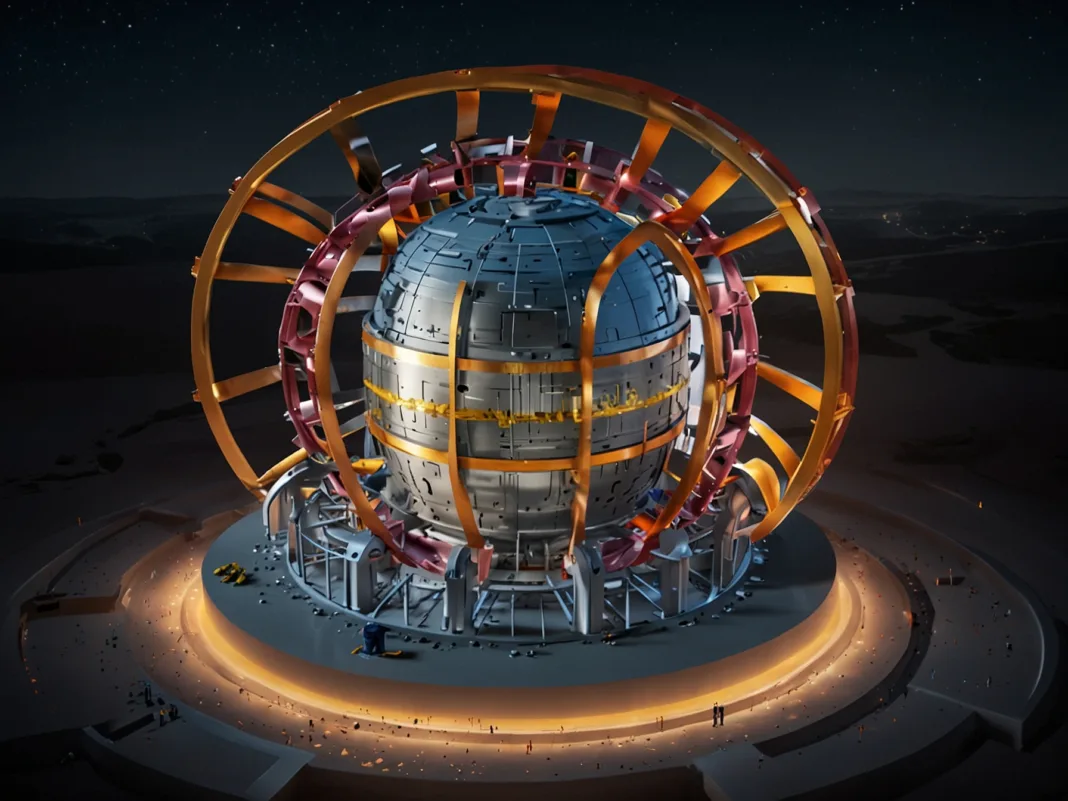The International Thermonuclear Experimental Reactor (ITER), a colossal nuclear fusion project situated in southern France, has recently announced a significant delay in its timeline. Initially expected to begin operations by 2025, the project now targets 2035 as the new go-live date. This ten-year delay has raised considerable concerns and questions about the feasibility and future of this €20 billion experiment. Amidst rising efforts by smaller commercial fusion endeavors, stakeholders and experts are left wondering if the ITER project remains worth the wait and investment.

© FNEWS.AI – Images created and owned by Fnews.AI, any use beyond the permitted scope requires written consent from Fnews.AI
Aiming to become the world’s largest fusion experiment, ITER was conceived with the promise of providing nearly limitless, clean energy by emulating the sun’s energy-producing processes. Upon completion, it is expected to produce 500 megawatts of power from 50 megawatts of input. However, the recent delay compounds a series of setbacks that have plagued the project since its inception in the late 20th century. Financial overruns, technical challenges, and international coordination issues have all contributed to slowed progress, and now the projected operational date has been pushed a decade further.
The significance of ITER cannot be dismissed easily. If successful, it will be a groundbreaking achievement, making substantial strides towards addressing global energy needs and reducing reliance on fossil fuels. Yet, this prolonged timeline is providing ammunition for critics who argue that the resources and effort channeled into ITER could be better spent on more agile and rapidly advancing private-sector fusion projects or renewable energy technologies.

© FNEWS.AI – Images created and owned by Fnews.AI, any use beyond the permitted scope requires written consent from Fnews.AI
In recent years, a burgeoning market of smaller, privately funded fusion startups has emerged. Companies such as Commonwealth Fusion Systems, Helion Energy, and TAE Technologies are chasing the dream of practical fusion energy, but with less financial baggage and more nimble operations. These firms employ innovative approaches, such as magnetic confinement and advanced materials, advancing their timelines significantly quicker than ITER. Commonwealth Fusion, for instance, ambitiously aims to produce net-positive energy by the early 2030s, even before ITER’s revised inaugural date.
Proponents of ITER argue that its international collaboration aspect sets it apart from private ventures, fostering scientific cooperation across geopolitical boundaries. Twelve major countries, including the United States, Russia, China, and members of the European Union, have come together to pool resources, technology, and expertise. This collective effort not only targets advances in fusion technology but also promises ancillary benefits in materials science, superconducting magnets, and precision engineering. These technological spinoffs could have far-reaching impacts beyond the realm of energy production.
Critics, however, question whether such an extensive and costly collaboration is justified, especially when advances in computational power and engineering could accelerate progress in smaller, more flexible initiatives. For example, the exponential growth in computer modeling and machine learning can now optimize complex simulations and materials testing far more efficiently than previously possible. This technological leap allows smaller companies to test hypotheses and new technologies faster, potentially circumventing the protracted timelines that have bogged down ITER.
Moreover, the evolving landscape of renewable energy technologies challenges fusion to stay relevant. Solar and wind power, alongside advancements in energy storage solutions like grid-scale batteries, are scaling rapidly and decreasing in cost. These renewable sources have the added benefit of already being deployable on a large scale, thus contributing to the global effort to combat climate change immediately. In this context, ITER and fusion energy, though promising, seem like an abstract, long-term solution in comparison.
Another point of contention revolves around the financial sustainability of ITER. With the project already consuming billions and recent delays hinting at further cost overruns, questions surface about the viability of continuous funding. The success of ITER hinges on sustained political and financial commitments from all partner nations, a challenging feat amid changing governmental priorities and economic climates. The alternative path for some suggests the reinvestment of these substantial funds into more immediate energy solutions or newer, more efficient fusion concepts that promise quicker returns.
Despite the criticisms, ITER continues to hold a symbolic stature in the scientific community. It represents one of the most ambitious cooperative scientific endeavors ever undertaken. The knowledge and experience gained from ITER, regardless of its ultimate success or failure, stand to push the boundaries of human understanding and technological capability. Should ITER succeed, it could deliver unparalleled access to clean, virtually inexhaustible energy, fundamentally altering the global energy landscape.
Thus, whether ITER’s recent delay marks the twilight of a failed ambition or just another step in a long and arduous journey remains to be seen. The fusion community, policy-makers, and the public are left balancing the potential benefits of continuing to invest in ITER against the opportunities offered by more immediate and competitive fusion and renewable projects. As the world navigates the complex energy challenges of the 21st century, the decisions made now will reverberate for decades, shaping the future of how we power our societies.
Was this content helpful to you?





